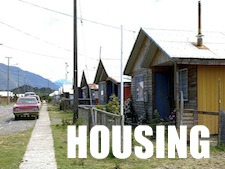Housing in Chile
ESL teachers generally have two options for housing upon their arrival in Chile. Your program may offer free room and board with a host family or you’ll be offered independent housing. If you do decide to live independently, you will be responsible for finding your own housing. You will also be responsible for all of the costs of the apartment, utilities, and food. Regardless of which option you choose, you can be sure that you will be treated well. Chileans pride themselves on their hospitality. When you live with a Chilean family, you will be treated as a member of the family.
Volunteers who have chosen to live in their own apartment have reported that it is necessary to dip into their own savings in order to afford an apartment. For example, a one-bedroom apartment can range from $400 to $500 per month. Expect utilities to be another $100 per month on top of that. Because of the expenses, and the difficulty that you may have finding housing near your school, it is recommended that volunteers take the opportunity to live with a host family.
All of the host families in Chile are carefully screened and selected. Factors such as the family’s ability to provide a volunteer with meals, a private room, and a safe environment are all taken into consideration. Your host family will also be able to provide you with amenities such as electricity and water. Keep in mind, though, that the standards of living may not be what you are used to in your home country.
Electricity: Chile’s electricity runs on 220 V and uses a 3 pin plug. If you are bringing appliances from home, you will need a plug adaptor, and a voltage converter in order to use your electric appliances in Chile.
Water: Chile is known for having a very high standard of water. Much of the water supply comes from the Andes mountains, and is therefore very pure and uncontaminated. Most people report that the tap water in Chile is drinkable. However, it’s a good idea to stick to bottled water for your first few days there, while your system is adjusting to the new country. Bottled water only costs about $1US per liter. Also, be aware that in some rural areas, outbreaks of water-borne diseases have occurred. In rural areas, it is advisable to stick to bottled water, or boil your water first.
Phones in Chile: If you need a landline, your host family will most likely have one available—just use it reasonably, and make sure to ask if you plan to make any long distance calls.
Cell phone coverage is good throughout the country. SIM cards are widely available. If you have an unlocked GSM phone, you can purchase a pre-paid SIM card for a few thousand Chilean pesos.
Go back to our Chile Country Guide page.


